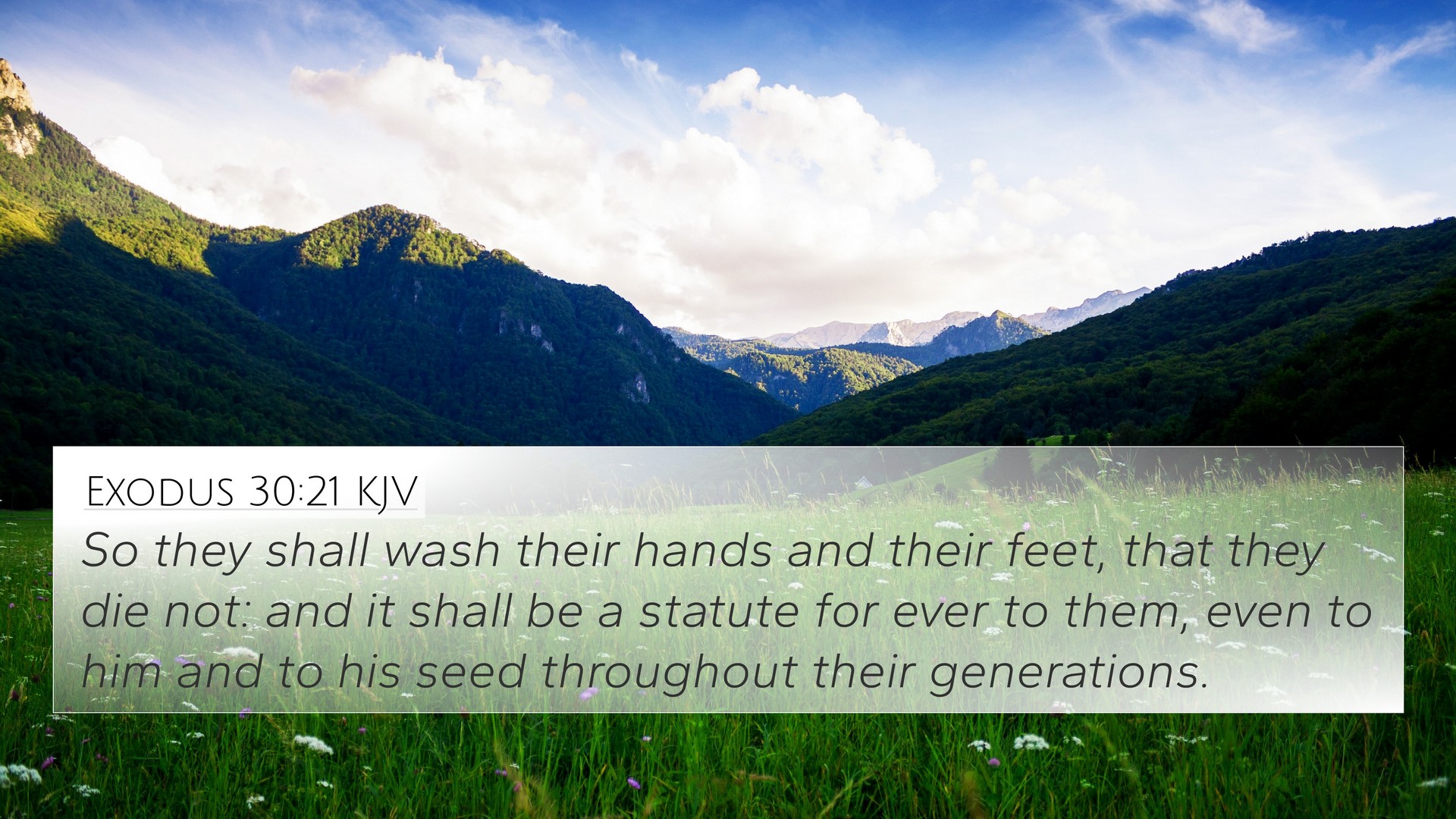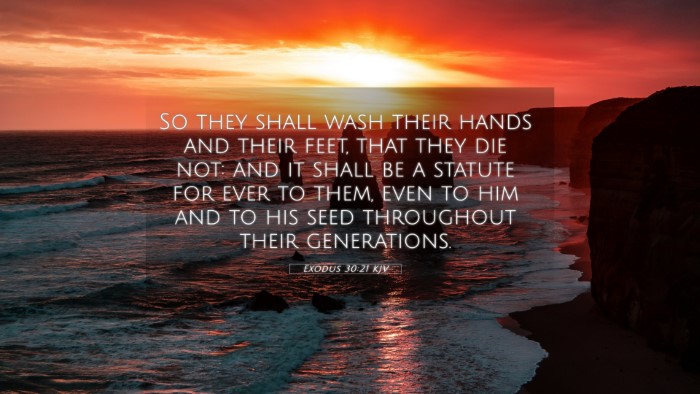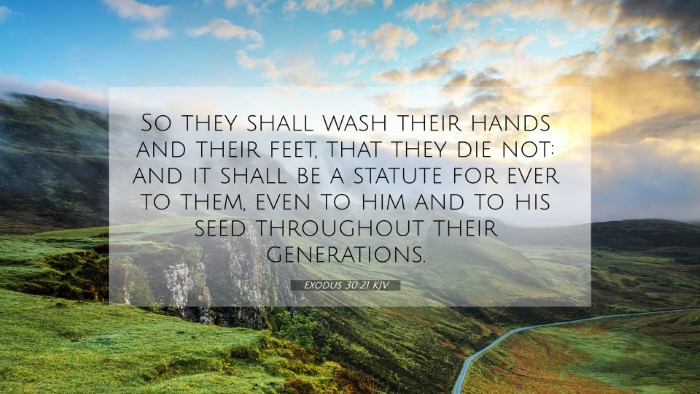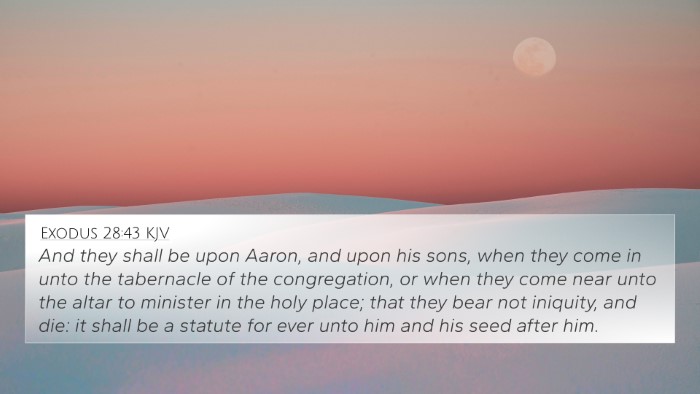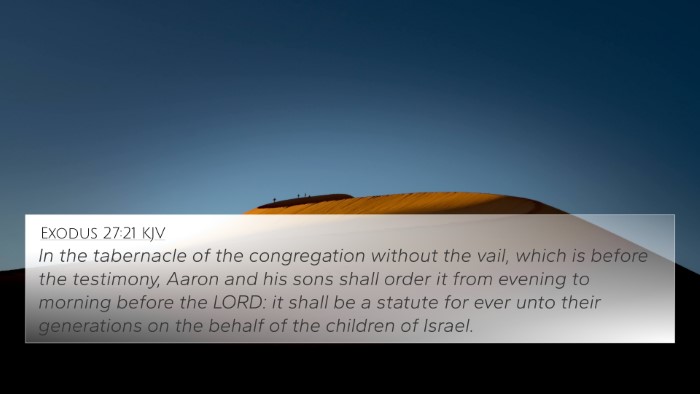Bible Verse Meaning: Exodus 30:21
Exodus 30:21 states: “So they shall wash their hands and their feet, so that they will not die; and it shall be a perpetual statute for them, for Aaron and his descendants throughout their generations.” This verse addresses the significance of ritual purity among the priests.
Overview of the Verse
This commandment is part of the instructions for the priests in the Old Testament, emphasizing the need for cleanliness and preparation before approaching God. Understanding its relevance is crucial for grasping the broader themes of holiness, obedience, and God's expectations for worship.
Commentary Insights
-
Matthew Henry:
Henry notes that this washing symbolizes the need for spiritual cleanliness before engaging in sacred duties. He emphasizes that defilement—whether physical or spiritual—can lead to severe consequences, illustrating God's serious stance on purity in worship.
-
Albert Barnes:
Barnes explains that the requirements for washing were not just ceremonial but practical in nature. He highlights that this practice served to instill a sense of reverence and fear of God, recognizing the importance of being prepared for divine service.
-
Adam Clarke:
Clarke elaborates on the importance of the washing basin, suggesting it represents both a literal cleansing and a deeper symbolic act of purification necessary for the priests before they entered their ministry. He also connects this act to New Testament themes of repentance and spiritual washing through Christ.
Thematic Connections
This verse highlights several crucial themes within the biblical narrative:
- Holiness: The emphasis on cleanliness reflects God's call for His people to be holy, as He is holy.
- Obedience: The repetitive mention of the significance of this law underscores God's expectation for His people to follow His commands faithfully.
- Preparation for Worship: It serves as a reminder to approach God with reverence and the proper mindset.
Key Cross-References
Exodus 30:21 connects to various other scripture passages, enriching the understanding of its message:
- Hebrews 10:22 - Encouraging believers to draw near to God with a sincere heart and full assurance of faith, paralleling the need for purification.
- Leviticus 16:30 - Explains the Day of Atonement and the importance of being cleansed from sin.
- 1 Peter 2:9 - Discusses believers as a royal priesthood, highlighting the continuity of the call to holiness.
- Matthew 5:8 - “Blessed are the pure in heart, for they shall see God,” reflecting the necessity of purity.
- Psalm 51:10 - David’s plea for a clean heart resonates with the requirement of internal purity.
- Isaiah 1:16 - Calls for cleansing and removal of evil deeds, reflecting similar themes of purification.
- John 13:10 - Jesus’ words on spiritual cleansing align with the need for continual purification in believers.
Practical Applications
For contemporary believers, the implications of Exodus 30:21 can be seen in several practical ways:
- Continually reflect on personal spiritual hygiene and the importance of confession.
- Recognize the seriousness of approaching God in worship with reverence.
- Develop a habit of preparing one’s heart and mind prior to engaging in prayer or worship.
Further Study Resources
For those interested in deeper exploration of biblical texts and cross-referencing themes, consider:
- Utilizing a Bible concordance to find related verses that expand on themes of purification.
- Applying a cross-reference Bible study method to explore connections between Exodus 30:21 and other significant passages.
- Accessing comprehensive Bible cross-reference materials to enhance understanding of Old and New Testament links.
Conclusion
Exodus 30:21 serves as a powerful reminder of the importance of purity, both physically and spiritually. By understanding this verse within its wider biblical context and connecting it with other scriptures, believers can appreciate God's standards and the continuity of His message of holiness throughout Scripture.
